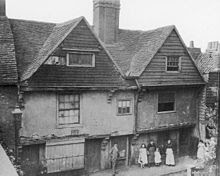 Sir Walter Raleigh, English aristocrat, writer, poet, soldier, courtier, spy, and explorer, was executed for allegedly conspiring against James I of England on the 29th October 1618. A more than somewhat interesting character.
Sir Walter Raleigh, English aristocrat, writer, poet, soldier, courtier, spy, and explorer, was executed for allegedly conspiring against James I of England on the 29th October 1618. A more than somewhat interesting character.Queen Elizabeth died in 1603, and Raleigh was arrested at Exeter Inn, Ashburton, Devon and imprisoned in the Tower of London on 19 July. On 17 November, Raleigh was tried in the converted Great Hall of Winchester Castle for treason, due to alleged involvement in the Main Plot against King James.
Raleigh conducted his defence with great skill. The chief evidence against Raleigh was the signed and sworn confession of one Cobham. Raleigh frequently requested that Cobham be called in to testify so that he might recant, "[Let] my accuser come face to face, and be deposed. Were the case but for a small copyhold, you would have witnesses or good proof to lead the jury to a verdict; and I am here for my life!" Raleigh essentially was objecting that the evidence against him was "hearsay"; but the tribunal refused to allow Cobham to testify and be cross examined Although hearsay was frowned upon under the common law, Raleigh was tried under civil-law, which allowed hearsay. King James spared his life, despite a guilty verdict.
 |
| Raleigh's cell in the Bloody Tower |
He remained in the tower until 1616. While imprisoned, he wrote many treatises and the first volume of The Historie of the World (London, 1628) about the ancient history of Greece and Rome. His son Carew was conceived and born (1604) while Raleigh was imprisoned in the tower.
In 1616, Raleigh was released to conduct a second expedition to Venezuela in search of El Dorado. During the expedition, Raleigh's men, under the command of Lawrence Kemys, attacked the Spanish outpost of Santo Tomé de Guayana (San Tomé) on the Orinoco River. In the initial attack on the settlement, Raleigh's son Walter was killed by a bullet. On Raleigh's return to England, the outraged Count Gondomar, the Spanish ambassador, successfully demanded that King James reinstate Raleigh's death sentence.
 |
| Raleigh's house at Blackwall, London. Photo 1890 |
Raleigh was beheaded in the Old Palace Yard at the Palace of Westminster on 29 October 1618. "Let us dispatch", he said to his executioner. "At this hour my ague comes upon me. I would not have my enemies think I quaked from fear." After he was allowed to see the axe that would behead him, he mused: "This is a sharp Medicine, but it is a Physician for all diseases and miseries." According to many biographers – R. Trevelyan in his book Sir Walter Raleigh (2003) for instance – Sir Walter's final words (as he lay ready for the axe to fall) were: "Strike, man, strike!"
He wrote the following poem, possibly whilst in the tower:
The Lie
Go, Soul, the body's guest,
Upon a thankless errand;
Fear not to touch the best;
The truth shall be thy warrant:
Go, since I needs must die,
And give the world the lie.
Say to the court, it glows
And shines like rotten wood;
Say to the church, it shows
What's good, and doth no good:
If church and court reply,
Then give them both the lie.
Tell potentates, they live
Acting by others' action;
Not loved unless they give,
Not strong but by a faction.
If potentates reply,
Give potentates the lie.
Tell men of high condition,
That manage the estate,
Their purpose is ambition,
Their practice only hate:
And if they once reply,
Then give them all the lie.
Tell them that brave it most,
They beg for more by spending,
Who, in their greatest cost,
Seek nothing but commending.
And if they make reply,
Then give them all the lie.
Tell zeal it wants devotion;
Tell love it is but lust;
Tell time it metes but motion;
Tell flesh it is but dust:
And wish them not reply,
For thou must give the lie.
Tell age it daily wasteth;
Tell honour how it alters;
Tell beauty how she blasteth;
Tell favour how it falters:
And as they shall reply,
Give every one the lie.
Tell wit how much it wrangles
In tickle points of niceness;
Tell wisdom she entangles
Herself in overwiseness:
And when they do reply,
Straight give them both the lie.
Tell physic of her boldness;
Tell skill it is pretension;
Tell charity of coldness;
Tell law it is contention:
And as they do reply,
So give them still the lie.
Tell fortune of her blindness;
Tell nature of decay;
Tell friendship of unkindness;
Tell justice of delay:
And if they will reply,
Then give them all the lie.
Tell arts they have no soundness,
But vary by esteeming;
Tell schools they want profoundness,
And stand too much on seeming:
If arts and schools reply,
Give arts and schools the lie.
Tell faith it's fled the city;
Tell how the country erreth;
Tell manhood shakes off pity
And virtue least preferreth:
And if they do reply,
Spare not to give the lie.
So when thou hast, as I
Commanded thee, done blabbing--
Although to give the lie
Deserves no less than stabbing--
Stab at thee he that will,
No stab the soul can kill.
No comments:
Post a Comment